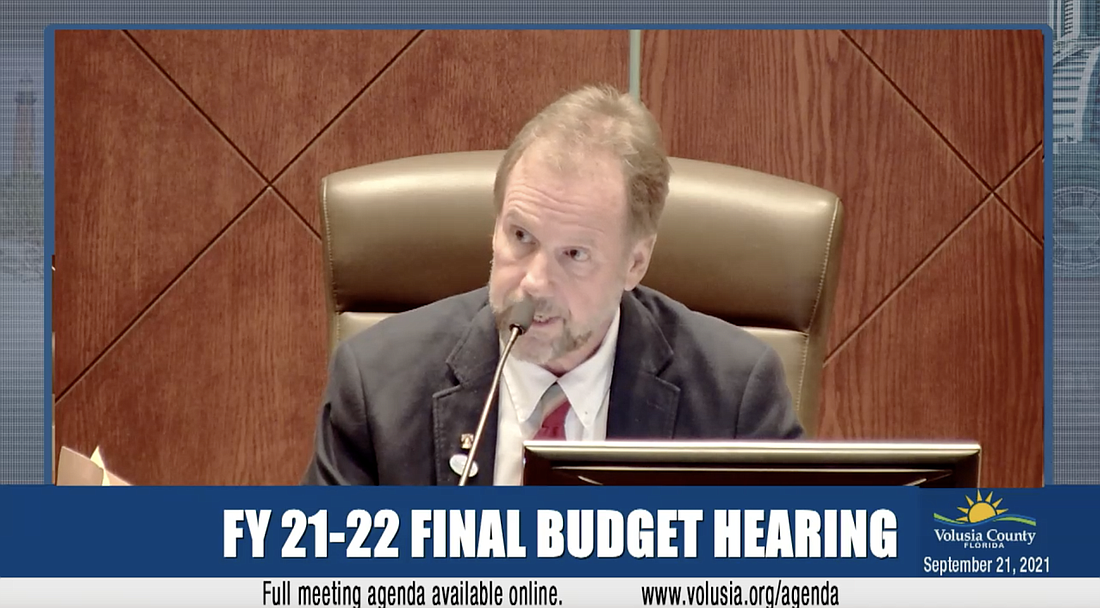- April 25, 2024
-
-
Loading

Loading

After two hours of public comment, with many residents asking Volusia County to adopt a rollback rate, the County Council approved a 3.4% property tax rate increase by way of a 5-2 vote at the second and final budget hearing on Tuesday, Sept. 21. Council Chair Jeff Brower and Councilwoman Heather Post voted against.
The budget for the county for the 2021-2022 fiscal year, which starts on Oct. 1, is now set at over $1.1 billion, with $961 million of those dollars accounting for the operating budget. Of that sum, $349.1 million come from the general fund, which is supported by the property tax rate of 5.3812 mills. While it is a reduction of the current tax rate of 5.45 mills — a result of the council slashing $2.8 million from the general fund budget last month — it is 3.43% higher than the rollback rate of 5.2025.
County Councilwoman Billie Wheeler said she couldn't justify adopting the rollback rate this year, "jeopardizing the future." Anything the council cuts or delays this year, it must address in the following year, she said, and as the county continues to grow, so do needs and services. Their decision was not impacted by threats of losing next year's election, she added; Wheeler is not running for re-election.
“I feel badly that this has gotten political, because I think there’s been a real division with that," Wheeler said. "When we’re up here and we’re elected, we’re elected as nonpartisan officials. That means we represent everybody.”
Brower maintained that adopting the rollback rate was possible if the county used more of its $61.1 million reserves. It would take an additional $7.3 million he claimed, but Volusia County Finance Department Director Ryan Ossowski said that figure would need to be over $18 million to cover capital projects and recurring expenses.
Brower argued that the county would continue to collect taxes next year, and believed it was wrong to say going to rollback will hurt the county.
Post said this wasn't the right time for a tax increase, and that when the council directs staff to present ways to save money, they should not be given an "Armageddon" message of cutting funds in public safety, water quality, parks and recreation, or firing employees.
“We heard from so many people tonight, throughout the last year and a half, how badly they are hurting from COVID," Post said. "We have passed out money from the federal government — $250 million dollars in totality that the county has received from the federal government in the last year and half — and I find it very hard to believe that it’s Armageddon in the county if we don’t raise taxes, that we’re not going to be able to sustain after all of that.”
After several mentions of "Armageddon," County Manager George Recktenwald said that it was about fiscal prudence. He reminded the council that the county did adopt the rollback rate in 2018, and that in 2020, they adopted the rollback rate in every fund but the general fund. The county did raise the property tax rate by almost 5% in 2019.
“We have to be there when there’s a problem," Recktenwald said. "We have to pay the bills on time. We have to take care of our employees. We have to take care of our citizens, and two-thirds of the budget, two-thirds of the general fund, is dedicated to public safety.”
Councilwoman Barb Girtman said the council initially discussed meeting half-way between the 4.3% tax rate increase that came with the property tax rate of 5.45 mills that was initially proposed and where the council arrived after cutting $2.8 million from the general fund budget. Brower had asked for a 5% reduction, and she proposed a 3% reduction.
“My greatest concern is I’d rather have a small impact now than a larger impact next year and the following years," Girtman said. "This year has been hard, but it’s also been a year where there were some supplemental help throughout the year, and I don’t see that coming next year.”